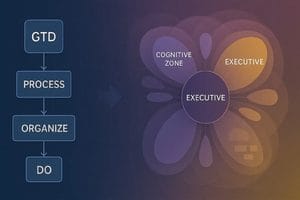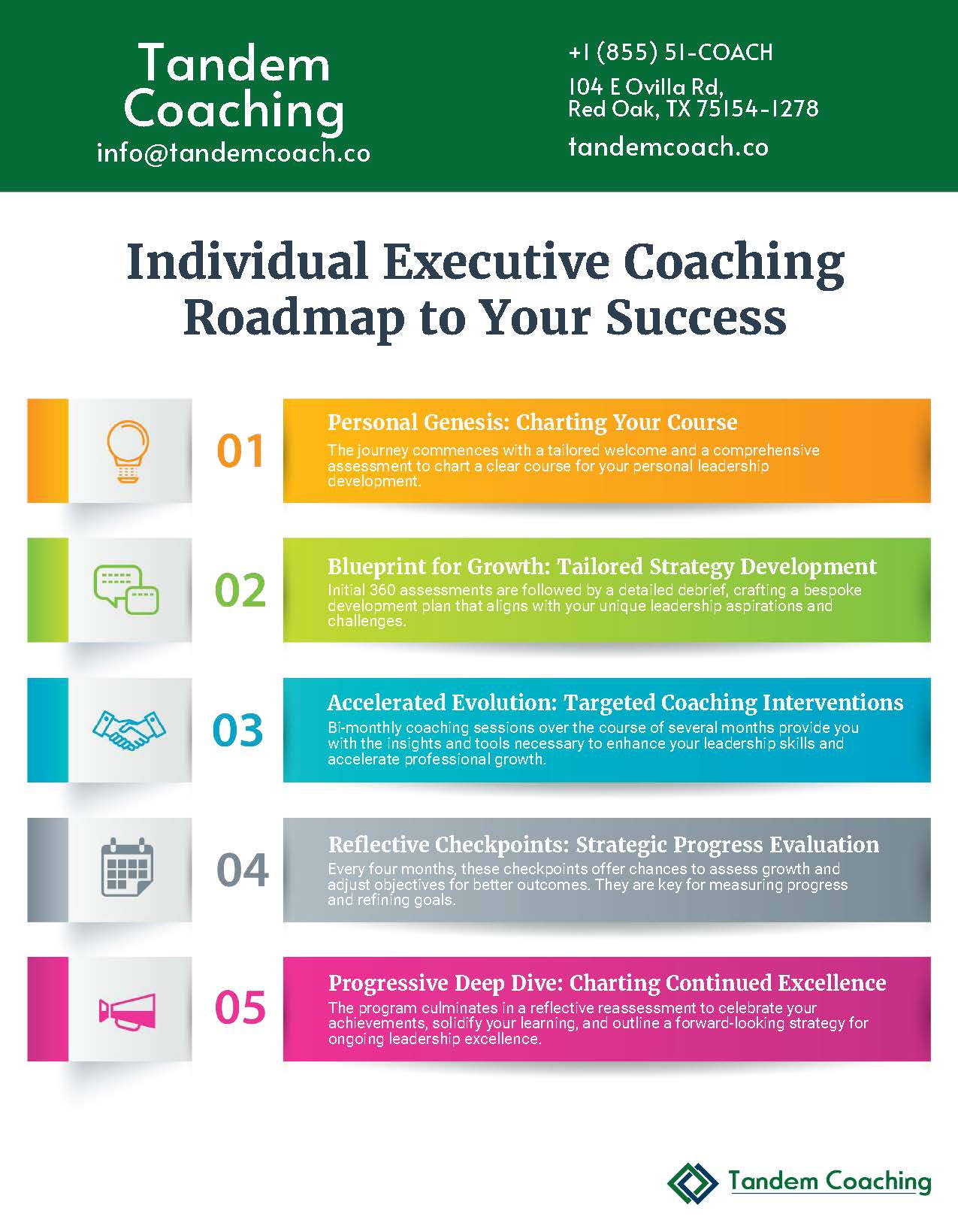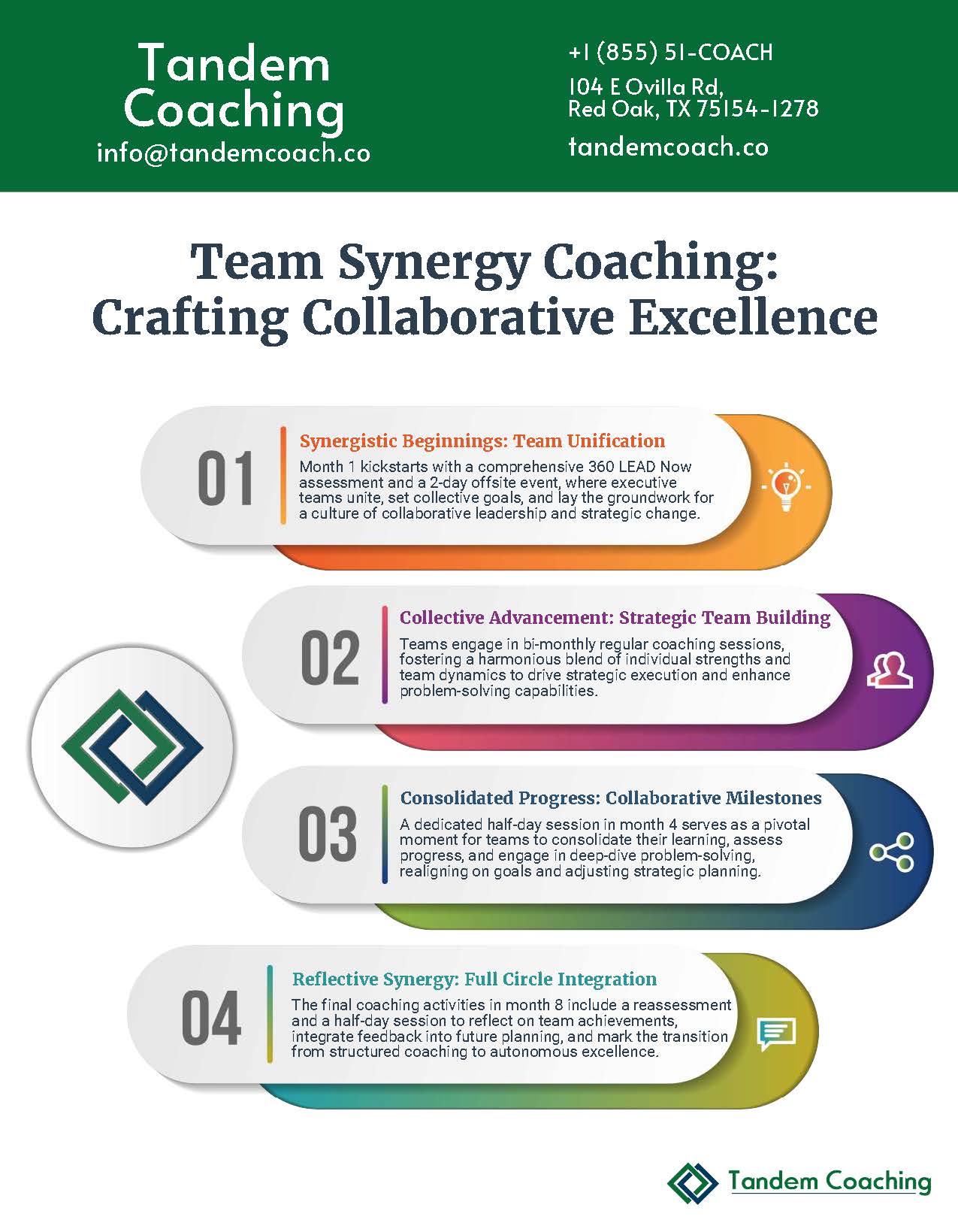“Emotional intelligence isn’t just a soft skill—it’s a leadership necessity, especially in tech.”
Key Takeaways: Why Emotional Intelligence Matters for Tech Leaders
- Transform Leadership with Emotional Intelligence: Emotional intelligence helps tech leaders manage stress, build stronger teams, and make better decisions under pressure.
- Executive Coaching as a Game Changer: Coaching provides personalized strategies to improve empathy, communication, and emotional regulation, leading to improved team dynamics and performance.
- Boost Organizational Culture: Leaders who invest in emotional intelligence create a positive work environment, fostering collaboration, trust, and innovation across the company.
- Beyond Work Impact: The emotional intelligence skills developed at work extend into personal life, improving relationships and reducing stress outside of the office.
Why Tech Leaders Struggle with Emotional Intelligence
Tech leaders, such as CTOs and IT managers, are often promoted because of their deep technical expertise. However, what is often overlooked is the significant shift in responsibilities that comes with leadership roles. While they are excellent at solving complex technical problems, many leaders are not trained, or even thinking about, the people side of the job when they step into it. The result is a leadership gap—where interpersonal skills, or emotional intelligence, are lacking. This gap can create challenges in effectively leading teams, especially in the fast-paced, high-stress environments common to the tech world.In many cases, a tech leader’s focus is entirely on project deadlines, technical outcomes, and product launches. For example, a newly promoted CTO may excel at managing the technical infrastructure but struggle with team dynamics. They may find themselves overwhelmed when interpersonal conflicts arise, not realizing that emotional intelligence is what’s needed to resolve these issues.Communication Challenges in Hybrid and Remote IT Teams
The shift to hybrid and remote work has added another layer of complexity for tech leaders. In a virtual setting, leaders lose much of the non-verbal cues that help them gauge team sentiment and resolve conflicts. This lack of face-to-face interaction often leads to communication gaps, misunderstandings, and reduced team morale.Without strong emotional intelligence, a leader might misinterpret silence as agreement or assume their instructions were clear when the team is actually confused. These issues often go unnoticed until they escalate into larger problems, disrupting workflow and causing friction within the team. Executive coaching helps leaders build empathy and active listening skills that are crucial in remote environments. Through coaching, leaders learn how to read between the lines of a Zoom meeting and pick up on subtle emotional cues that can prevent small issues from becoming big problems.“In remote teams, emotional intelligence becomes the glue that holds communication together. Without it, leaders risk losing sight of their team’s emotional state.”
The High-Pressure Environment of Tech Leadership
Tech leaders work in high-pressure environments where innovation and rapid decision-making are key. But with these demands come significant stress. Leaders are expected to stay calm and collected while managing multiple high-stakes projects. For many, the ability to regulate their own emotions and lead effectively under pressure is not something they’ve been trained to do.Without the proper emotional regulation, leaders may react impulsively during crises, leading to poor decision-making and further stress for their teams. For instance, a CTO facing a critical system failure might lash out at their team in frustration, creating a negative work environment. Executive coaching offers practical strategies, such as mindfulness and stress management, to help leaders remain composed and make better decisions under pressure.By focusing on key areas like self-awareness and emotional regulation, coaching helps leaders develop the skills needed to navigate these high-pressure situations, ensuring that they can guide their teams without letting stress get the better of them.How Executive Coaching Improves Emotional Intelligence in IT Leaders
For many tech leaders, the journey to developing emotional intelligence starts with personalized coaching. Unlike general training programs, executive coaching tailors its approach to the unique challenges faced by each leader. This personalized touch is particularly important for IT leaders, who often find themselves dealing with high-pressure environments, remote teams, and complex decision-making processes. By focusing on specific pain points like stress management and interpersonal communication, coaching helps leaders build the emotional intelligence needed to excel in these areas.
Personalized Coaching to Boost Emotional Intelligence
Every leader’s emotional intelligence needs are different. A newly promoted CTO might struggle with balancing their technical expertise with people management, while a more experienced tech leader might need help improving their communication with non-technical teams. Executive coaching for tech leaders takes these specific needs into account, offering tailored strategies to help them develop emotional intelligence in ways that make sense for their role.
Another aspect that resonates with many leaders is the relevance of the coach’s own background. While it’s not mandatory for coaches to have been tech leaders themselves, many find it easier to connect with a coach who understands the pressures and complexities of the tech industry. A coach with similar experience can more easily relate to struggles like managing innovation or leading cross-functional teams, making the coaching process feel more relevant and impactful.
For example, a CTO struggling with delegation might work with a coach who has managed similar challenges. Through personalized guidance, the leader can develop empathy and self-awareness, allowing them to delegate more effectively and foster a more collaborative work environment. The result is not only improved leadership but also a stronger, more cohesive team.
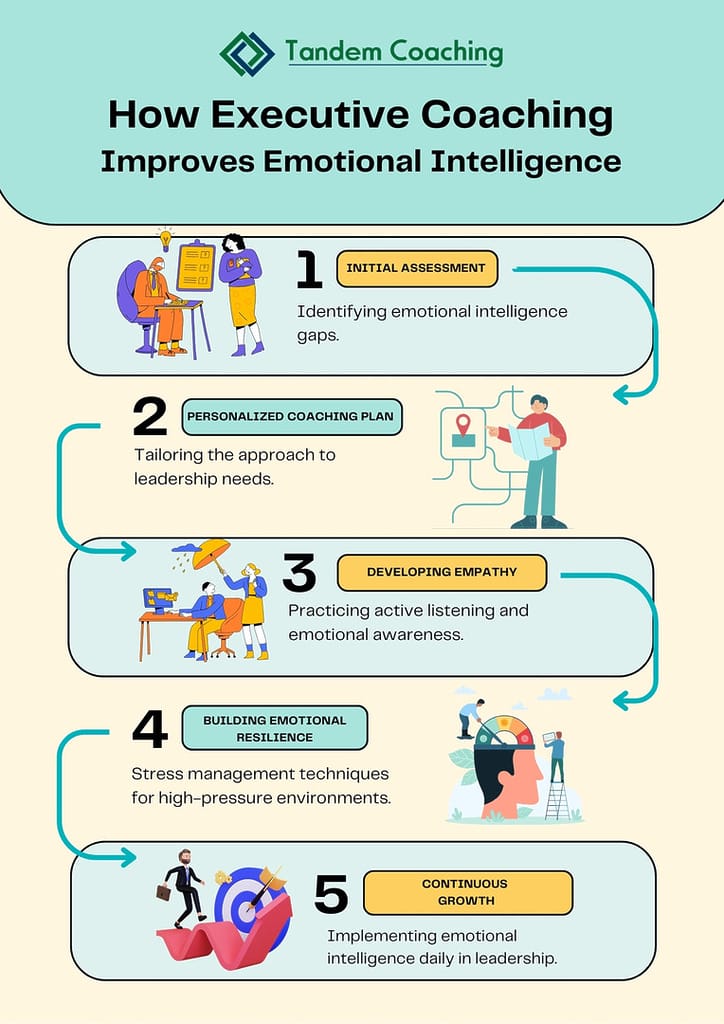
Building Emotional Resilience Through Coaching
Emotional resilience is a critical component of leadership, especially in the fast-moving world of tech. From product failures to sudden market shifts, tech leaders must navigate crises while keeping their teams focused and motivated. Executive coaching plays a key role in helping leaders build this resilience by teaching them how to regulate their emotions and respond calmly under pressure.
One common strategy used in coaching is mindfulness. Leaders might be guided through mindfulness exercises that help them stay grounded during stressful situations, such as a critical system failure or a missed project deadline. Over time, this practice becomes second nature, enabling leaders to face challenges with a clear mind and a steady hand. Through coaching for emotional resilience, leaders learn not only how to manage their own emotions but also how to create a positive, stable environment for their teams.
“Emotional resilience is not about avoiding stress but learning how to thrive in it. The more resilient the leader, the stronger the team.”
Building emotional resilience also impacts decision-making. When leaders are better able to regulate their emotions, they are more likely to make thoughtful, strategic decisions, even in high-pressure situations. This benefit extends beyond the individual, improving the overall performance of the team and the organization.
Benefits of Emotional Intelligence for IT Leaders
Tech leaders who develop emotional intelligence quickly see its benefits in their daily interactions, decision-making, and overall leadership. Whether improving collaboration, driving innovation, or boosting executive presence, emotional intelligence enables leaders to lead more effectively. Here are some key areas where emotional intelligence makes a difference for IT leaders:
Improving Team Collaboration and Conflict Resolution
Effective collaboration is the cornerstone of any successful tech team. Whether managing a small development group or a cross-functional team spread across multiple departments, tech leaders must foster open communication and resolve conflicts quickly. Without emotional intelligence, leaders might struggle to understand their team’s emotions, leading to misunderstandings and unresolved tension.
For example, an IT manager overseeing a project may notice friction between two senior engineers. Without the skills to navigate these interpersonal challenges, the conflict could slow down the entire project. Executive coaching for tech leaders helps leaders develop empathy, enabling them to identify the root cause of the conflict and mediate a resolution that benefits both parties and the team as a whole. Leaders with strong active listening skills can engage all team members, making them feel heard and valued, which is essential for successful collaboration.

Boosting Innovation and Creativity in Tech Projects
Innovation thrives in environments where team members feel safe to take risks and share ideas. Leaders who excel in emotional intelligence can create this type of environment. By managing their emotions and regulating their reactions, leaders encourage open dialogue and out-of-the-box thinking. When the leader’s emotional stability is evident, team members feel more comfortable expressing unconventional ideas.
Consider a tech team working on a new software solution. A leader without emotional intelligence might shut down unconventional ideas too quickly or dismiss input without considering its potential. This stifles creativity and discourages team members from speaking up. On the other hand, a leader who practices emotional intelligence, perhaps by using techniques learned through coaching, fosters an open-minded culture. The result? More creative solutions, better problem-solving, and a team that isn’t afraid to take calculated risks.
“Innovation doesn’t happen in a vacuum. It’s a byproduct of a team that feels emotionally safe and engaged.”
Enhancing Executive Presence in High-Stakes Meetings
Tech leaders often need to present complex technical ideas to non-technical executives or stakeholders. This is where executive presence comes into play. Leaders with high emotional intelligence can manage their nerves, remain calm under pressure, and communicate complex concepts with clarity. This strengthens their credibility and helps them build trust with stakeholders.
Imagine a CTO presenting a critical project update to a board of directors. Without emotional regulation, the leader might come across as flustered, potentially leading to miscommunication or confusion. Executive coaching helps tech leaders enhance their presence by teaching them how to manage emotions, project confidence, and articulate ideas effectively. This leads to better outcomes in high-stakes meetings, where a strong, calm presence can make all the difference.
By developing emotional intelligence, leaders not only improve their ability to communicate under pressure but also enhance their overall executive presence, which is critical for long-term success in leadership roles.
Real-Life Case Studies of Emotional Intelligence in Tech Leadership
To fully grasp the importance of emotional intelligence in tech leadership, let’s look at two detailed examples where executive coaching played a key role in transforming leadership dynamics and improving team performance. These case studies highlight specific challenges tech leaders face and how emotional intelligence becomes the game-changer.
Case Study: How a CTO Used Coaching to Improve Team Dynamics
A CTO of a mid-sized tech company found himself leading a growing engineering team that struggled with internal conflict. His team of 30 developers was divided into smaller agile units, each responsible for different projects. Tension grew between senior engineers and newer hires, and despite multiple attempts at team-building activities, the friction only increased. As deadlines loomed, communication broke down, and productivity dipped.
Initially, the CTO’s solution was to enforce stricter guidelines and ramp up project oversight, thinking that increased structure would reduce friction. Instead, it worsened. Senior engineers felt micromanaged, while junior members became hesitant to share ideas, fearing criticism from more experienced colleagues. The CTO’s technical focus blinded him to the emotional undercurrents in the team, leaving him ill-equipped to address the root of the conflict—emotional disconnects and lack of empathy.
Through executive coaching, the CTO learned to shift his approach from managing tasks to managing people. The coaching focused on self-awareness, helping him recognize how his reactive responses to conflict were contributing to the tension. Instead of jumping into problem-solving mode during team disagreements, the CTO began practicing active listening. In one specific instance, a disagreement between two senior engineers over coding practices had escalated. Instead of enforcing a decision, the CTO facilitated a conversation where each engineer could explain their reasoning without interruption.
This was followed by a strategy learned in his coaching sessions: the CTO summarized what each engineer said, validating their viewpoints before offering any solutions. By doing this, he created a space where both parties felt heard and respected. This emotional validation defused the situation and opened up room for a compromise that blended both engineers’ approaches.
The shift in leadership approach had profound effects. Team communication improved significantly, with fewer escalations and faster conflict resolution. Engineers—both senior and junior—became more willing to collaborate and share ideas. The coaching not only helped the CTO manage team dynamics but also empowered him to foster a culture where emotional intelligence and empathy became integral parts of the team’s workflow. The team’s productivity rebounded, and they successfully met the project deadline, exceeding stakeholder expectations. Most importantly, the team’s morale and trust in leadership grew, laying the foundation for long-term success.
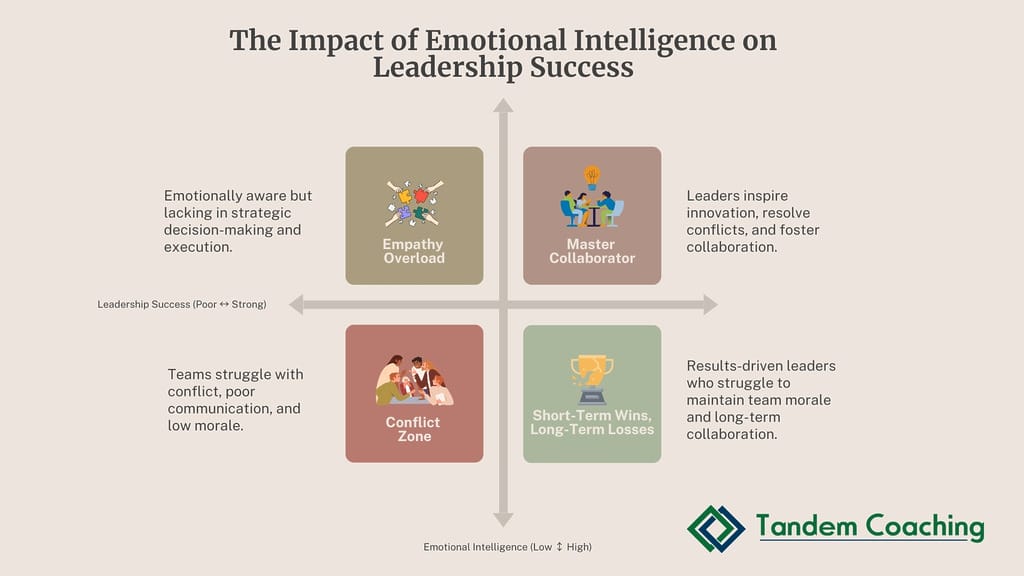
Success Story: Transforming Leadership with Emotional Intelligence Coaching
An IT Director in a rapidly scaling fintech company was tasked with integrating two separate development teams after a merger. The newly combined team of 40 engineers faced immediate issues with collaboration, as each group had different coding standards, tools, and working habits. The Director, who excelled in technical problem-solving, struggled to get the teams to align and trust each other. Deadlines were slipping, and the pressure from upper management was mounting.
In the initial stages, the Director tried to solve the problem through traditional leadership tactics—assigning team leads, increasing status meetings, and pushing for faster code delivery. However, he failed to account for the deeper issue: the team members’ resistance to change and their frustration at losing their previous ways of working. Trust between the two groups was fragile, and frequent misunderstandings led to delayed code reviews and conflicting feature releases.
Through executive coaching focused on empathy and relationship management, the IT Director learned to identify and address the emotional hurdles his team was facing. Instead of focusing solely on technical alignment, he used coaching techniques like emotional regulation to control his own frustration when deadlines were missed. He also began hosting weekly “open-forum” meetings where engineers could voice their concerns, frustrations, and ideas without judgment.
In one key instance, a long-standing disagreement over which code repository tool to use was creating friction between the two groups. The Director, instead of making an executive decision as he had in the past, invited both sides to present the pros and cons of their preferred tools. More importantly, he paid attention to the emotional undertones—acknowledging the fear of change and the perceived loss of control that the team members were experiencing. Through mindfulness and emotional validation, the Director was able to foster a more collaborative dialogue, leading the team to choose a compromise solution that both sides could support.
By applying emotional intelligence skills learned through coaching, the Director was able to rebuild trust within the newly merged team. Collaboration improved as the team felt more empowered to contribute to decisions, and they began to see themselves as a unified group rather than two competing factions. As a result, project timelines got back on track, and the Director was praised for successfully leading the team through a difficult transition. This case illustrates how developing emotional intelligence can help leaders manage not only technical challenges but also the complex human dynamics that come with team mergers and scaling.
“Leadership isn’t just about managing projects; it’s about managing people’s emotions in the midst of those projects.”
These case studies highlight the transformative power of emotional intelligence for tech leaders. Through executive coaching, both the CTO and IT Director were able to address deep-rooted team issues, improve communication, and create environments where teams could thrive. Emotional intelligence didn’t just solve interpersonal conflicts; it drove tangible results, including better collaboration, improved morale, and on-time project delivery.
Long-Term Impact of Executive Coaching on Emotional Intelligence
While executive coaching often focuses on immediate workplace challenges, its effects extend far beyond the office walls. Leaders who work on developing emotional intelligence (EQ) through coaching not only enhance their leadership skills but also experience long-lasting personal growth. These improvements positively impact how they interact with their teams, make decisions, and even how they contribute to their company’s broader culture.Sustaining Emotional Growth Beyond the Coaching Engagement
One of the key benefits of coaching is that the emotional intelligence skills developed during the engagement don’t fade once the coaching sessions are over. Leaders who undergo personalized coaching learn to practice self-awareness, emotional regulation, and empathy regularly. This repeated practice helps embed these skills into their daily habits, ensuring long-term growth.For instance, a CTO who learns how to manage their emotions during high-stress product launches can apply the same techniques to future crises. Whether it’s taking a mindful moment before reacting to a failed project or practicing active listening during a team conflict, the emotional skills learned through coaching build resilience. As leaders continue to grow emotionally, they become better equipped to handle new challenges and navigate complex team dynamics with confidence.More importantly, emotionally intelligent leaders influence their teams. By modeling behaviors like empathy, clear communication, and emotional regulation, they set the tone for how teams interact with each other. The long-term result is a workplace culture built on respect, understanding, and collaboration.How Emotional Intelligence Elevates Organizational Culture in Tech Firms
In tech companies, where innovation and speed are critical, emotionally intelligent leaders play a pivotal role in shaping the company culture. Leaders who actively practice empathy and emotional regulation foster an environment where creativity thrives. Teams feel more psychologically safe, which leads to more open discussions, quicker conflict resolution, and a culture of trust.For example, in companies with emotionally intelligent leadership, team members are more likely to take risks with new ideas without fearing judgment. Leaders who understand the emotional pulse of their organization can also identify and address employee burnout early, leading to higher engagement and retention.Through executive coaching, leaders not only develop their own emotional skills but also contribute to a more cohesive and adaptive organizational culture. The benefits ripple outward, affecting how employees collaborate and innovate. A leader who models empathy creates a workplace where people feel valued, which directly impacts both performance and satisfaction.“Leadership isn’t about being in charge. It’s about taking care of those in your charge.” – Simon Sinek
How Emotional Intelligence Impacts Life Outside of Work
What many leaders don’t expect is how developing emotional intelligence at work seeps into their personal lives. A leader who has learned to practice emotional regulation during stressful meetings may find the same skill useful in managing family dynamics or personal conflicts. Executive coaching teaches leaders not just workplace tools but life tools, helping them build stronger relationships, communicate more effectively, and manage personal stress better.For example, a CTO who once struggled to balance their work stress with their family life may now use mindfulness techniques to stay present and calm at home. By practicing empathy and active listening at work, they may find themselves better equipped to navigate challenging conversations in their personal life. Emotional intelligence, therefore, doesn’t just make leaders more effective in their jobs—it makes them better, more grounded individuals in all aspects of life.This holistic benefit of emotional intelligence underscores the broader value of executive coaching. When leaders grow emotionally, both their professional and personal lives improve, leading to more balanced, fulfilled living.By developing emotional intelligence, leaders not only improve their workplace effectiveness but also positively impact their company culture and personal life. The long-term benefits of executive coaching are transformative, shaping emotionally resilient leaders who thrive in every aspect of their lives.
Choosing the Right Executive Coach for IT Leaders
Selecting the right executive coach is a critical decision for any tech leader looking to enhance their emotional intelligence and leadership skills. While many leaders naturally gravitate toward coaches who have direct experience in the tech industry, it’s essential not to overlook the value that coaches from diverse backgrounds can bring. Here’s a breakdown of what tech leaders should consider when choosing the right coach.
What to Look for in an Executive Coach for Tech Professionals
It’s common for IT leaders to prioritize finding a coach with direct experience in the tech field. After all, the challenges in tech leadership—navigating complex systems, managing innovation, and leading technical teams—are unique. A coach with firsthand knowledge of these issues can seem like the perfect fit.
Take Alex Kudinov, MCC, one of the founders of Tandem Coaching. With years of experience in IT, Alex has faced the exact struggles that many tech leaders are dealing with today. As an ICF Master Certified Coach, he uses a direct, hands-on coaching style that resonates with IT professionals who are looking for practical, experienced-based solutions. He knows the pressures of product launches, managing development teams, and balancing technical demands with leadership responsibilities because he’s lived it.
However, while it’s beneficial to have a coach who shares this background, focusing solely on tech experience might mean overlooking other valuable perspectives. Coaches who have worked in tech-adjacent fields, or those with a broader understanding of leadership dynamics, can offer fresh insights and a more holistic view.
The Role of Experience and Understanding of the Tech Industry in Coaching
For example, Cherie Silas, MCC, another founder of Tandem Coaching, brings a different yet equally valuable approach. Though she hasn’t worked as deeply in the trenches of IT, she has extensive experience coaching leaders in the tech industry, specializing in agile methodologies and executive coaching. Cherie’s strength lies in her ability to see the broader picture—how leaders are perceived by their teams, peers, and the organization as a whole. Her coaching style might appeal to tech leaders looking to step back and understand how their leadership impacts not just their immediate team but the company culture and long-term strategic goals.
By having this outside perspective, coaches like Cherie help tech leaders break out of their tunnel vision. She offers a more holistic approach, guiding leaders to not only address the technical challenges but also improve how they build relationships, manage conflicts, and communicate across the organization.
“The best coaches don’t just help you solve the problem in front of you—they help you become the kind of leader who can handle the next problem on your own.”
When choosing an executive coach, it’s important to recognize the strengths that both direct experience and broader perspectives bring. Coaches like Alex provide practical, experience-driven solutions, while coaches like Cherie help leaders see the bigger picture and develop skills that go beyond immediate technical concerns. The best choice depends on the individual needs of the leader, and often, a blend of both perspectives is the most powerful approach.
What we want you to realize is that while direct tech experience can be valuable in a coach, sometimes a broader, more holistic approach—like the one offered by Tandem Coaching—might lead to deeper, long-term leadership development. The emotional intelligence needed to lead tech teams isn’t just about solving today’s technical problems but also about understanding how to navigate people and organizational challenges more effectively.
Conclusion: Why Emotional Intelligence is the Key to Leadership Success in Tech
As we’ve explored throughout this article, emotional intelligence (EQ) isn’t just a helpful addition to a leader’s toolkit—it’s essential for anyone looking to thrive in a high-stakes, fast-paced tech environment. The ability to manage emotions, understand team dynamics, and communicate effectively often makes the difference between a successful project and one that stalls due to unresolved conflicts.For tech leaders, the development of emotional intelligence is particularly important. It equips them with the skills needed to foster better collaboration, resolve conflicts quickly, and lead teams with empathy and resilience. Through executive coaching, IT professionals can learn to sharpen their emotional intelligence, which directly improves their decision-making, team engagement, and overall leadership performance.Recap of Key Benefits for Tech Leaders
From building team collaboration to improving executive presence, emotional intelligence touches all aspects of leadership in tech. Leaders who invest in coaching to enhance these skills see immediate and long-term benefits, including:- Improved communication and conflict resolution: Emotional intelligence helps leaders navigate complex team dynamics, leading to smoother workflows and stronger relationships across teams.
- Better decision-making: Leaders with high emotional intelligence are more likely to make thoughtful, strategic decisions, especially under pressure. They can regulate their emotions and avoid reactive choices that may harm the team or project.
- Stronger team morale: Teams led by emotionally intelligent leaders are more engaged, collaborative, and willing to share ideas. This creates a culture of trust and innovation, critical in the tech industry.
Ongoing Adaptation and Future Growth with Emotional Intelligence
Emotional intelligence is not a skill set that can be developed overnight; it requires ongoing commitment and adaptation. Leaders who consistently practice empathy, self-awareness, and emotional regulation find that these skills continue to evolve with them as their responsibilities grow.As the tech industry rapidly changes, with new technologies, remote working models, and shifting team dynamics, leaders will need to rely on emotional intelligence more than ever. The capacity to adapt emotionally to new challenges is what will set successful leaders apart in the years to come.Moreover, emotional intelligence developed at work can extend into other areas of life, improving personal relationships and reducing stress outside of the office. Leaders who learn these skills through coaching often find that they become more balanced, effective, and fulfilled not just in their careers, but in their personal lives as well.“Great leaders don’t just manage teams; they manage emotions—their own and those of the people around them.”Emotional intelligence is the foundation for effective leadership in the tech industry. Leaders who embrace it through executive coaching position themselves and their teams for long-term success, both professionally and personally.
FAQs: How Executive Coaching Enhances Emotional Intelligence for Tech Leaders
What is emotional intelligence, and why is it essential for tech leaders?
Emotional intelligence (EQ) refers to the ability to recognize, understand, and manage your emotions, while also being aware of the emotions of others. For tech leaders, EQ is critical because it allows them to communicate more effectively, resolve conflicts, and manage high-pressure environments. By developing emotional intelligence, tech leaders can foster collaboration, improve team dynamics, and lead their teams with empathy and resilience.
How can executive coaching improve emotional intelligence for IT leaders?
Executive coaching provides a personalized approach to developing emotional intelligence. Coaches help leaders identify areas where emotional skills are lacking, such as empathy or self-awareness, and work on targeted strategies to improve them. Through techniques like mindfulness and active listening, tech leaders learn how to regulate their emotions, make better decisions under pressure, and inspire trust within their teams. This results in more effective leadership and improved team performance.
How does emotional intelligence improve team collaboration and conflict resolution?
Leaders with high emotional intelligence can better manage team conflicts and foster a collaborative environment. By using empathy and emotional regulation, leaders can understand different perspectives and resolve disputes quickly. Emotional intelligence helps leaders communicate more effectively, ensuring that all team members feel heard and valued. This creates a culture of trust and collaboration, which is essential for success in fast-paced tech environments.
How does executive coaching help leaders manage stress in high-pressure environments?
Tech leaders often face intense pressure to deliver results quickly. Executive coaching teaches leaders how to manage stress through techniques like mindfulness and emotional regulation. Leaders learn how to stay calm in crisis situations, make thoughtful decisions, and avoid emotional outbursts that could harm team morale. By developing emotional resilience, leaders can better navigate high-stakes moments and maintain a stable work environment for their teams.
Can executive coaching improve emotional intelligence in hybrid or remote teams?
Yes, executive coaching is especially beneficial for leaders managing hybrid or remote teams. In these environments, communication barriers and misunderstandings can easily arise. Through coaching, leaders develop the emotional intelligence skills necessary to bridge these gaps. They learn how to interpret emotional cues in virtual settings and improve team communication through active listening and empathy. This leads to stronger relationships and more productive remote collaborations.
How does emotional intelligence affect innovation in tech teams?
Innovation flourishes in environments where team members feel emotionally safe to share ideas and take risks. Leaders with high emotional intelligence foster a culture of openness and trust, where employees are encouraged to think outside the box. By managing their own emotions and responding empathetically to others, leaders can boost creativity and drive innovation. This type of leadership not only enhances individual performance but also leads to more innovative solutions within tech teams.
Do tech leaders need a coach with direct IT experience to improve emotional intelligence?
While it’s common for tech leaders to seek coaches with IT backgrounds, it’s not always necessary. A coach with direct IT experience, like Alex Kudinov from Tandem Coaching, can offer relatable insights into the challenges tech leaders face. However, coaches with broader leadership experience, like Cherie Silas, can provide valuable external perspectives, helping leaders see the bigger picture. Both approaches offer unique benefits, and the best choice depends on the leader’s specific needs.
What role does emotional intelligence play in enhancing executive presence?
Executive presence is about how leaders carry themselves and communicate in high-stakes situations. Emotional intelligence is critical for building a strong executive presence because it helps leaders stay composed under pressure, communicate clearly, and respond thoughtfully to challenges. By developing emotional regulation and self-awareness through coaching, leaders can enhance their executive presence and command respect from peers, subordinates, and stakeholders alike.
How does emotional intelligence contribute to long-term success in leadership?
Leaders with high emotional intelligence are more adaptable, resilient, and better equipped to handle both interpersonal and organizational challenges. By continually practicing empathy, emotional regulation, and self-awareness, leaders can create lasting change within their teams and organizations. Through executive coaching, leaders develop the skills needed not only to solve current problems but to grow and evolve as the demands of their roles change, ensuring long-term leadership success.
Can emotional intelligence learned at work impact personal life as well?
Yes, the emotional intelligence skills developed through executive coaching often extend beyond the workplace and into personal life. Leaders who practice emotional regulation and empathy in their professional roles are likely to use these skills in personal relationships as well, leading to better communication, reduced stress, and stronger connections with family and friends. Emotional intelligence can help leaders achieve balance and fulfillment in all aspects of life.
